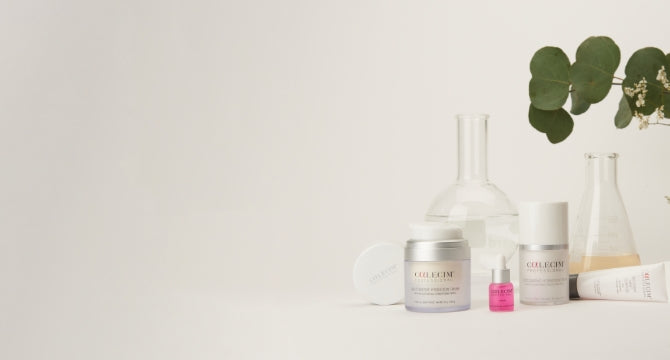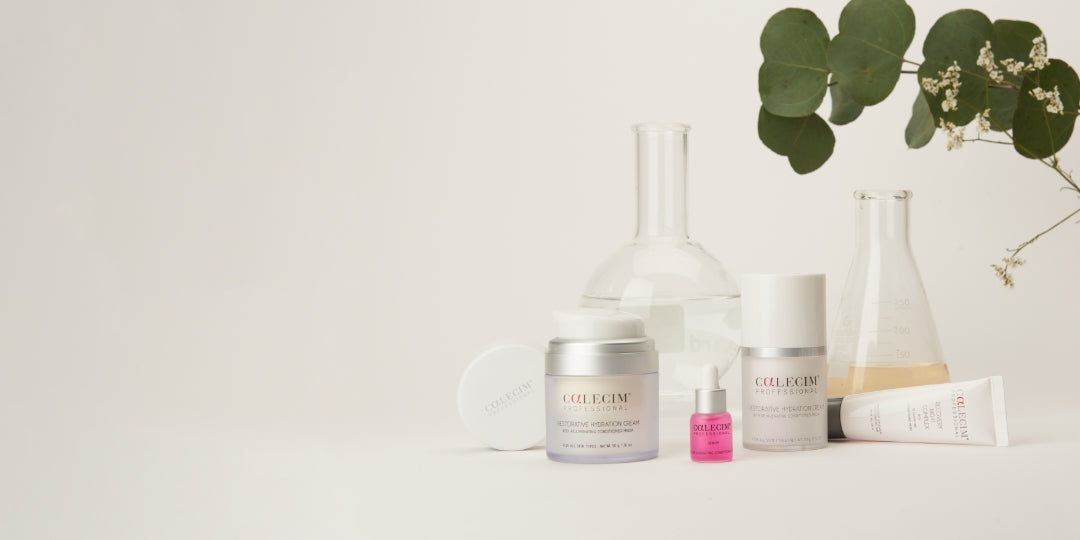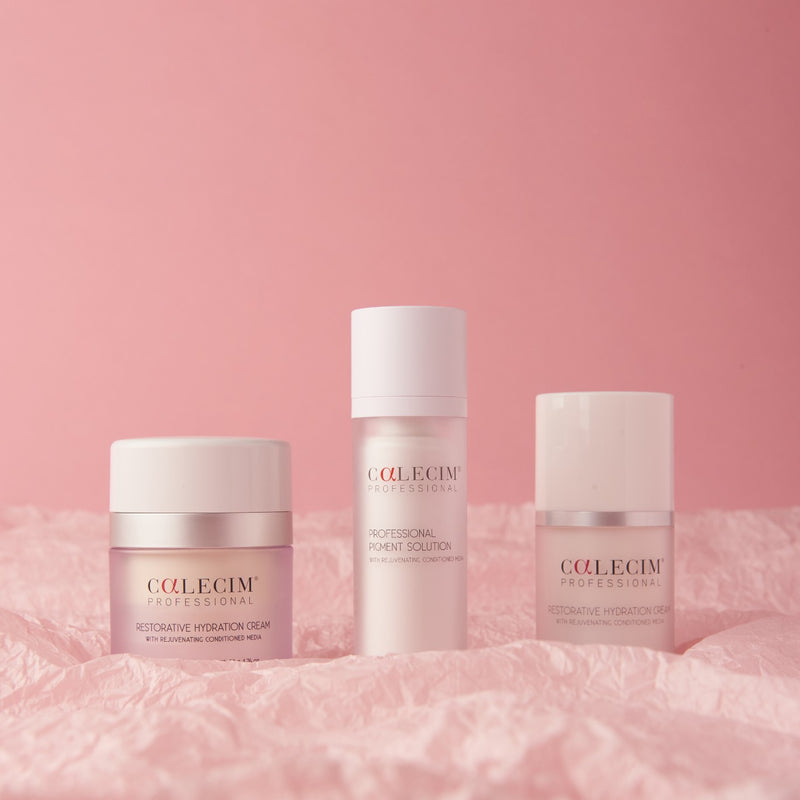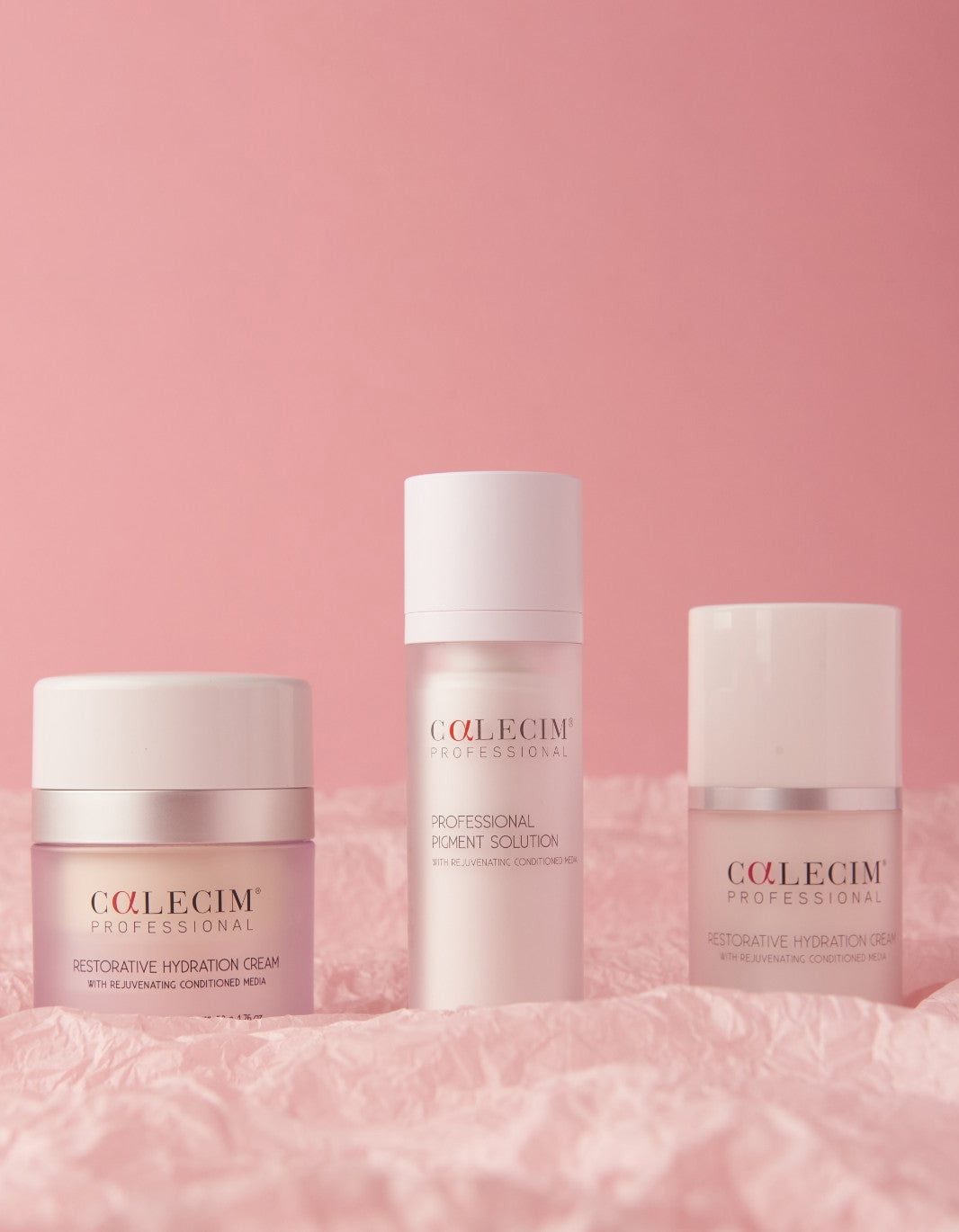How stem cell skincare can boost the benefits of clinical skin resurfacing procedures
A variety of in-office skin rejuvenation procedures can address skin that’s dry, rough, or uneven as well as treat conditions such as wrinkles, scarring, pigmentation, or lax skin. The results are often glowing as your skin is given a reinvigorating boost that helps dead cells to shed, and encourages healthy skin cells to rise to the surface.
Yet, as good as those procedures are, you can benefit from a post-procedure application of CALECIM® Professional Serum to optimize results. The skin restoring benefits, from growth factors and exosomes that make up CALECIM®'s patented active ingredient PTT-6® , can decrease downtime and enhance the aesthetic results of your treatment.
Stem cell derived growth factors and exosomes: For faster skin repair
CALECIM® Professional Serum contains high concentrations of PTT-6® derived from our ethical source of stem cells. This mix of growth factors, exosomes, peptides and proteins sends signals to your skin to help enhance the natural restoration process of skin. In laboratory studies, PTT-6® has been shown to encourage skin cell mobility, resulting in accelerated healing. It has also been shown to produce anti-inflammatory proteins.
Recover faster from clinical laser treatments
In the clinics, this scientific data is translated to reduced swelling and redness in post-procedure skin of patients. Even highly invasive procedures such as fractional CO2 laser treatments to treat skin texture and acne scarring show dramatic decrease in downtime when Professional Serum is applied immediately after and for the following week after the treatment. Patients are more satisfied with their treatments as they are able to resume their regular routine and social life more quickly.
By helping to accelerate the skin’s self-healing properties, Professional Serum is a compatible companion to various in-office procedures. It is able to enhance results by
- Reducing swelling, redness, and discomfort
- Decreasing downtime
- Helping the skin to accelerate healing of micro-injuries caused by the procedures for better aesthetic results
Let’s look more closely at the various treatments that can be complemented by Professional Serum.
Types of In-Clinic Treatments
There now exists are wide variety of in-clinic rejuvenating treatments that can address many skin conditions. It is important to choose one that will meet your specific requirement, be it
- Acne and acne scarring
- Tattoos
- Skin pigmentation
- Uneven skin texture and tone
- Deep wrinkles
- Skin laxity
- Fine lines and crepey skin surface
Non-ablative Lasers
Non-invasive, non-ablative lasers such as CoolTouch are ideal for subtle improvement of mild wrinkles, crepey skin, and scars, while the non-ablative Fraxel laser is used to correct fine wrinkles and reduce the appearance of mild scarring. Both the Pulsed Dye Laser (PDL) and alexandrite laser help treat spider veins, pigmented lesions, and vascular lesions.
Side effects of non-ablative lasers include several days of redness, scabbing and/or swelling.
Ablative Lasers, such as CO2 Lasers
Ablative lasers commonly address issues including acne scarring, skin pigmentation irregularities, collagen loss, mild to moderate wrinkles, skin laxity, and photoaging. These include lasers such as Nd:YAG, Erbium, or fractional CO2.
Side effects of ablative lasers include redness, blistering, and swelling for up to a week, increased risk of scarring, and several days of downtime.
Microneedling / Microneedling with Radio Frequency
Microneedling generally addresses skin laxity, age spots, acne scars, and rough skin texture, while microneedling with RF corrects skin laxity, age spots, acne scars, large pores, wrinkles, and rough or uneven skin texture. Both minimally invasive procedures can cause side effects like redness and inflammation for 1-2 days along with 2-3 days of downtime.
Microdermabrasion
A minimally invasive microdermabrasion procedure addresses superficial issues such as uneven skin tone and texture. Depending on the intensity of the treatment, side effects range from slight redness and irritation for a few hours to about 2-3 days.
Chemical Peels
Chemical peels can be superficial or deep, depending on the concentration of the solution used, and are ideal for treating conditions such as melasma, uneven skin tone and texture, and age spots. Depending on the depth of the peel, side effects can include 1-3 days of redness and irritation as well as up to a week of photo/sun sensitivity and downtime.
HydraFacial
For dehydrated skin, uneven skin tone, fine lines, and wrinkles, you might choose the minimally invasive, superficial HydraFacial. It helps hydrate your skin, cleaning dirt and debris from your pores, and rarely, if ever, causes side effects or downtime.
The best stem cell skincare to use after clinical skin treatments
While some procedures can cause irritation to skin resulting in downtime, others are only mildly traumatic to skin. CALECIM® is able to complement both types of treatments. Its active ingredient is highly effective in reducing post-procedure inflammation to skin; it is also rejuvenative as stem cell proteins and exosomes can help skin cell regeneration, and regulate the skin cycle so that fresh, young skin cells can rise to the surface of the skin. The results are increased radiance and glow, the hallmark of youthful, healthy skin.
All in-clinic treatments allow the benefits of CALECIM® to penetrate deeply into the skin, by the use of CALECIM® Professional Serum immediately after the procedure. CALECIM® Professional Multi-Action Cream can be used in-between clinic visits to extend the aesthetic results, allowing for optimized benefits for your in-clinic investment.































